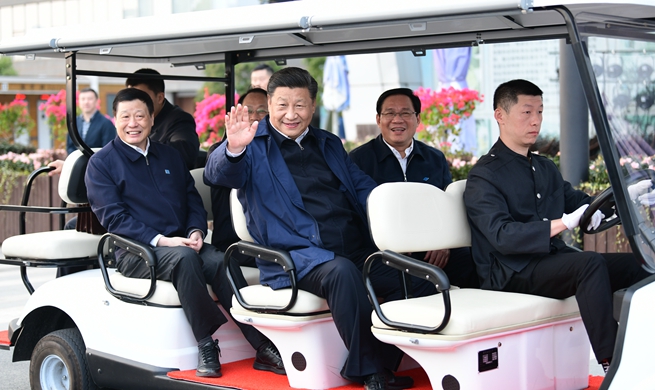by Maria Vasileiou
THE HAGUE, Nov. 2 (Xinhua) -- As Brexit remains uncertain, an economist with a major Dtuch bank has warned its impact on Dutch business, and raised additional concerns over the impact on the country's export-oriented economy.
"The persistent uncertainty, following the new Brexit extension, hurts firms which have strong exposure to UK markets," said Stefan Koopman, senior market economist at Rabobank.
The Dutch economist gave three reasons of the judgement. First, investment related to firms' exposure to the UK is being postponed. Second, there is a risk that firms will think twice before they prepare for another Brexit-cliff. Finally, businesses grow weary as they wait for more Brexit certainty and may decide to relocate their supply chains or selling markets.
The UK was due to leave the EU on Oct. 31, but responding to the British government's request, the remaining 27 European leaders agreed earlier this week to a third delay of Brexit by Jan. 31, 2020.
DUTCH PORT TO BE HIT
Port of Rotterdam Authority (PRA) spokesperson Leon Willems echoed the uncertainty concern, saying "investment decisions are put on hold, while prolongation adds to the cost."
Rotterdam, Europe's largest port, has long been preparing contingency planning to mitigate the impact of a no-deal Brexit, putting in place measures as part of coordinated action to avoid long container haulage delays resulting from additional customs formalities. According to Willems, although the Brexit extension offers perspectives for an orderly departure of the UK from the EU, a no-deal Brexit remains a possibility.
A no-deal Brexit would mean the immediate re-establishment of customs controls on goods from the UK, leading to serious problems and disruptions in the port of Rotterdam.
According to the PRA, around 40 million tonnes of goods are shipped between the Netherlands and Britain every year via Rotterdam port, which is also the main hub for cargo passing from other EU member states to Britain. Operators could no longer go through the current process of customs clearance in the case of a hard Brexit.
"We stress that importers and exporters need to pre-alert their cargo digitally via Portbase," Willems said. Portbase, the Dutch digitalized port communications system, has developed a chain-wide solution for the customs obligations which will be in effect in the Dutch ports following Brexit. Some 15 percent of companies which ship goods to Britain through the Netherlands have failed to complete the necessary paperwork for their trucks to embark on ferries after Brexit. The PRA has established buffer parking spaces for up to 700 trucks, if their customs documents have not been properly prepared to go through customs clearance. "The buffer parking locations for trucks are currently dismantled, but they will be put in place again when the next Brexit deadline is approaching," Willems said.
IMPACT ON TRADE
Brexit's impact expands further than just serious problems at the port of Rotterdam. The Netherlands is among the EU countries expected to be severely hit by Britain's withdrawal from the bloc. In light of this, but also because there is no clarity on what the UK's departure from the EU will look like, the Dutch parliament has given its approval for emergency powers to the government to pass laws in the event of a no-deal Brexit.
"The UK is our third-largest export partner and around 8 percent of our export in goods is destined for the UK," said Koopman. "There is also a relatively big services trade between the two countries. Because of these close trading links, the impact of Brexit on the Netherlands will be larger than in many other EU countries, apart from Ireland. For example, any tariffs on food or additional border checks and documentation requirements will hamper trade between the UK and the Netherlands."
According to a study by the Paris-based Organization for Economic Cooperation and Development (OECD), a Brexit increase in tariff and non-tariff costs of exporting into Britain would result in a decline of almost 17 percent in total Dutch exports to Britain.
Sectors such as the food industry, agriculture, chemistry and trade will, suffer a lot from the cost increase that will occur. The Ministry of Finance, which has played a key role in the country's preparedness to deal with Brexit, has offered special cash vouchers to companies covering up to 50 percent of the actual costs with a maximum of 2,500 euros to alleviate some of the burden. Erik Jeene, spokesperson at the Ministry of Finance explained that the Brexit Voucher is for advice regarding alternative markets or to identify issues regarding logistics or the free movement of persons, goods and services. "The new Brexit extension allows more time to companies to prepare better," he said.
The Dutch government has also launched an information campaign for businesses, which also included a "muppet" character representing Brexit that becomes a serious obstacle to companies. The Dutch "Brexit monster" has recently "made a new appearance" with the launch of a new government advice booklet.
A special online program, the Brexit Impact Scan, has also been launched to help businesses identify possible consequences that Brexit could have on their operations.
The Finance Ministry has also prepared for the appointment of 900 new customs officers. "At the end of the year they will all be fully trained to take their positions ahead of the Jan. 31 deadline," said Jeene.
MACROECONOMIC CONCERNS
Lost output in Dutch growth is also a negative Brexit outcome. "We have calculated that a no-deal Brexit will cost the Dutch economy around 1.2 percent of GDP in 2020 alone," Rabobank's Koopman said. "A managed Brexit that will be followed by a relatively narrow Free Trade Agreement, which is the goal of British Prime Minister Boris Johnson, may in the long-run, until 2030, cost the Dutch economy about 3 percent in lost output growth".
In the period through 2023 the Dutch Court of Audit (DCA) has estimated that possible macroeconomic effects caused by Brexit to the Netherlands stand at 2.3 billion euros. DCA has estimated that the country might have to pay also higher contributions to the EU budget to compensate for an annual shortfall of 13 billion euros, when the UK leaves the EU. According to the national audit office, when Britain leaves the EU, the Netherlands will have to pay an extra 1.25 billion euros in 2021 to shore up the EU budget.
According to a recent report by Dutch financial newspaper Financieele Dagblad, the Netherlands' contribution to the EU may rise to 62.5 percent over the next few years, if the European Commission manages to get its new spending plans approved. In this case the annual Dutch contribution will soar to 13 billion euros by 2027. Next year, the Dutch contribution is estimated at 8 billion euros. The European Commission, the EU's executive, wants to increase the EU budget to 1.11 percent of European GDP, while the Netherlands wants to keep to the current 1 percent.
According to Koopman, there is another big issue for the Netherlands after Brexit. "A bigger risk is that the Netherlands becomes more isolated in the EU. We lose our 'big brother' with Brexit, which has already opened the door to renewed power balancing," the Dutch economist said.
"The Dutch government intends to replace the UK as the leading voice for free trade and a more pragmatic and economic EU rather than simply an ever closer Union, but we are just a country of 17 million people and a small open economy. We are dependent on friendly and beneficial international relations with France and Germany, and I don't think that the government dares to put these relations at serious risk in order to make a point," said the economist.













